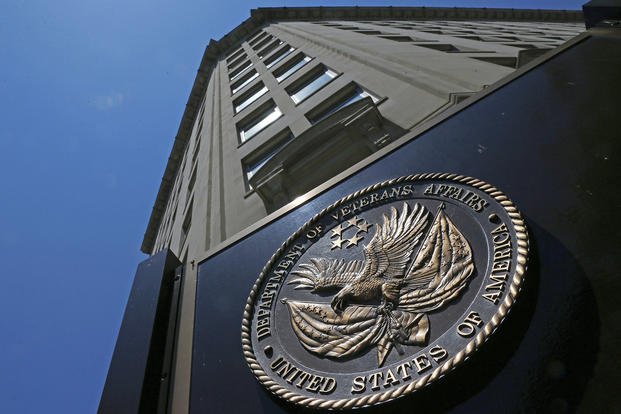The Department of Veterans Affairs rolled out its fiscal 2025 proposed budget Monday, a $369.3 billion plan that would increase spending for medical care, infrastructure, women's health, benefits under the PACT Act and anticipated changes to the VA's family caregiver program.
The proposal, announced just three days after President Joe Biden signed a fiscal 2024 funding package for six cabinet agencies, including the VA, represents a nearly 13% increase from VA's total funding for the year from all sources.
But according to White House budget documents, the bulk of the increases fall under mandatory spending -- the portion required to cover disability compensation, pensions and salaries -- largely as a result of an expansion of PACT Act-related benefits and not the discretionary request, the portion of the budget that covers all expenses besides entitlements.
Read Next: Supply or Die: Sustaining Marines in the High North so They Can Fight and Win a Future War
The proposed $134 billion in discretionary spending is actually a tenth of a percentage point lower than the 2024 approved amount, the result of constraints placed on federal agencies by a deal struck under the Fiscal Responsibility Act.
VA officials said, however, that when considering other sources of VA funding, such as the Toxic Exposures Act and medical debt collections, the proposed budget is "adequate and fully funds" the VA.
"We had a record year -- all told, we're delivering more care and more benefits to more veterans than ever before. That's our goal this year and every year. The '25 budget requests will enable us to continue this performance and deliver more care and more benefits to veterans," said Jon Rychalski, the VA's chief financial officer, during a call with reporters Monday.
For health care alone, when considering all funding sources, the VA plans to spend nearly $150 billion, including $86 billion for medical services provided directly by VA and $41 billion for community care, with nearly half of community care funding coming from alternative sources -- not discretionary funding -- that bolsters spending for the program by 12%.
Rychalski said that a 34% cut in discretionary spending for community care reflects the VA's inclusion of its alternate funding sources, as well as a department push to provide care directly to veterans within VA facilities.
He added that while VA does not plan to "take away choice from any veteran," the VA has worked to improve care in its hospitals and clinics, and veterans fare better medically when they are treated by VA providers, one of the key reasons VA is heavily investing in its health-care system.
"We are projecting that community care will come down and utilization of the direct-care system will increase, and that's why you'll see community care shows a reduction in the budget," Rychalski said.
The budget request includes $17.2 billion for mental health care, a 6% increase from this year, to support expansion of programs and increase access to providers and strengthen its suicide prevention efforts.
And it includes a huge boost for the department's caregiver programs. In anticipation of changes expected this year to the Program of Comprehensive Assistance for Family Caregivers, the VA has budgeted $2.9 billion for caregiver support, a 20% increase.
The VA has been reviewing eligibility rules for the program, which provides health care and stipends to loved ones who care for veterans in their homes, rather than in assisted living or senior facilities, and the budget planning reflects that, according to the White House budget documents.
"This funding allows for potential program changes, allowing VA to reach and support more caregivers than before," the documents stated.
Women's health services also would see a large increase under the proposal, up 11% from 2024 to $1.1 billion. Programs to prevent veterans homelessness would receive a 3% increase, as well, to $3.2 billion.
The proposal allots $24.5 billion for the Toxic Exposures Fund, an account established to address the costs associated with the 2022 PACT Act, which expanded health-care access and disability benefits to veterans sickened by environmental pollutants during military service.
And it includes roughly $2.8 billion for construction, a 65% increase for the VA's growing facilities and maintenance needs. Projects include a new critical care facility in West Los Angeles, expansion of a mental health clinic and other facilities in Dallas, and a cemetery expansion in Denver.
The budget trims 3% off the department's information technology funding. That reduction reflects the pause the department has taken in adopting a new electronic health records system, said Dr. Neil Evans, VA's acting program executive director for the VA Electronic Health Record Modernization Integration Office.
The VA anticipates restarting the process this year but additional deployments have already been funded and the money needed to jump-start the effort would "come from prior year dollars," Evans said.
In addition to the fiscal 2025 budget, the request asks for $159 billion in advanced appropriations for medical care for fiscal 2026, a measure VA includes every year to ensure that the department can provide health services to veterans in the event of a government shutdown.
The request, part of a $7.3 trillion package Biden sent to Congress, represents the largest VA budget to date, a 13% increase from fiscal 2024 and nearly 2½ times its budget just a decade ago.
The plan will be considered by Congress in the coming months. Lawmakers have a deadline to pass a budget by Oct. 1; they last met that deadline for the VA's fiscal budget in 2018.
VA Secretary Denis McDonough said the budget proposal will help deliver "the very best health care and benefits that this country has to offer."
"With these investments, we at VA can continue delivering more care and more benefits to more veterans than ever before in our nation's history," McDonough said in a statement on Monday.
Related: Veterans' Gun Rights Amendment Included in Compromise Must-Pass VA Spending Bill













